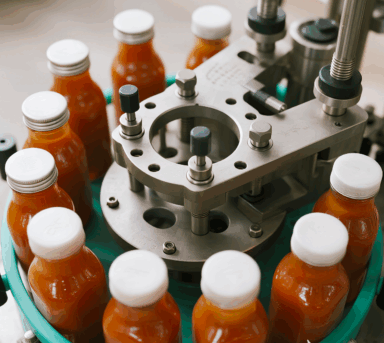Table of Contents
ToggleEnsuring food safety is a critical concern for modern production lines, and the role of a filling capping machine in this process cannot be overstated. Properly designed and maintained machines help prevent contamination, maintain product quality, and ensure regulatory compliance. From beverages to sauces and dairy products, food-grade filling capping machines are engineered to meet hygiene standards while maintaining high-speed production.

Filling Capping Machine Hygiene Design
- Food-Grade Materials
Modern filling capping machines are constructed from stainless steel and other food-safe materials. These surfaces are resistant to corrosion, easy to clean, and prevent bacterial growth. For example, a dairy production line using 316 stainless steel filling nozzles reduces contamination risk in acidic or high-fat products.
- Smooth Surface and Minimal Crevices
Machines are designed with smooth surfaces and minimal joints to prevent liquid residue buildup. Crevices and tight corners can harbor bacteria, compromising food safety. By reducing potential contamination sites, manufacturers can maintain hygiene standards even during high-speed operation, typically 60–100 bottles per minute for beverages.
Automation and Contamination Prevention
- Closed Filling Systems
Closed filling systems in filling capping machines minimize exposure to air and external contaminants. Sensors monitor the liquid level, and automated valves prevent overflow, reducing the chance of spills and bacterial contamination. For instance, a juice line using closed filling nozzles can reduce product loss by up to 3% compared to open-fill systems.
- Cap Sterilization
Caps can be a source of contamination if not properly handled. Many modern filling capping machines include UV or hot-air sterilization systems that disinfect caps before sealing. This ensures that the sealed product remains safe for consumption, even during high-speed production up to 120 bottles per minute.
Operational Safety for Food Quality
- Temperature and Pressure Control
Controlling the temperature and pressure during filling is crucial for maintaining food quality. A filling capping machine that handles viscous liquids like sauces or syrups must maintain a consistent filling temperature to prevent bacterial growth. Piston or rotary pumps can deliver ±1% filling accuracy while keeping the product within safe temperature ranges.
- Avoiding Cross-Contamination
Automated cleaning-in-place systems integrated into filling capping machines prevent cross-contamination between batches. High-pressure water and approved cleaning agents flush the pipelines and nozzles between product runs. For multi-product lines, CIP cycles can be completed in as little as 15 minutes, minimizing downtime while maintaining hygiene.
Monitoring and Maintenance
- Sensor-Based Fault Detection
Advanced filling capping machines include sensors that detect missing bottles, cap misalignment, or low liquid levels. Visual and audible alarms notify operators immediately, preventing contamination and product waste. For example, a sensor that detects bottle absence within 0.01 seconds can stop the machine, ensuring that no unsealed bottles enter the packaging process.
- Scheduled Safety and Hygiene Checks
Regular maintenance is critical for food safety. Inspections of pumps, nozzles, and capping heads should occur every 500 operating hours for high-speed lines. Proper lubrication, calibration, and replacement of worn parts help maintain both operational efficiency and hygiene standards.
Conclusion
A filling capping machine plays a vital role in ensuring food safety across beverage, dairy, and sauce production lines. Food-grade materials, closed filling systems, cap sterilization, temperature and pressure control, and automated fault detection all contribute to hygiene and product quality.
By combining modern technology with proper maintenance and operator training, manufacturers can minimize contamination risks, maintain regulatory compliance, and achieve consistent production efficiency. Investing in a machine with comprehensive food safety features is not optional—it is essential for maintaining consumer trust and product integrity in today’s competitive market.
0

